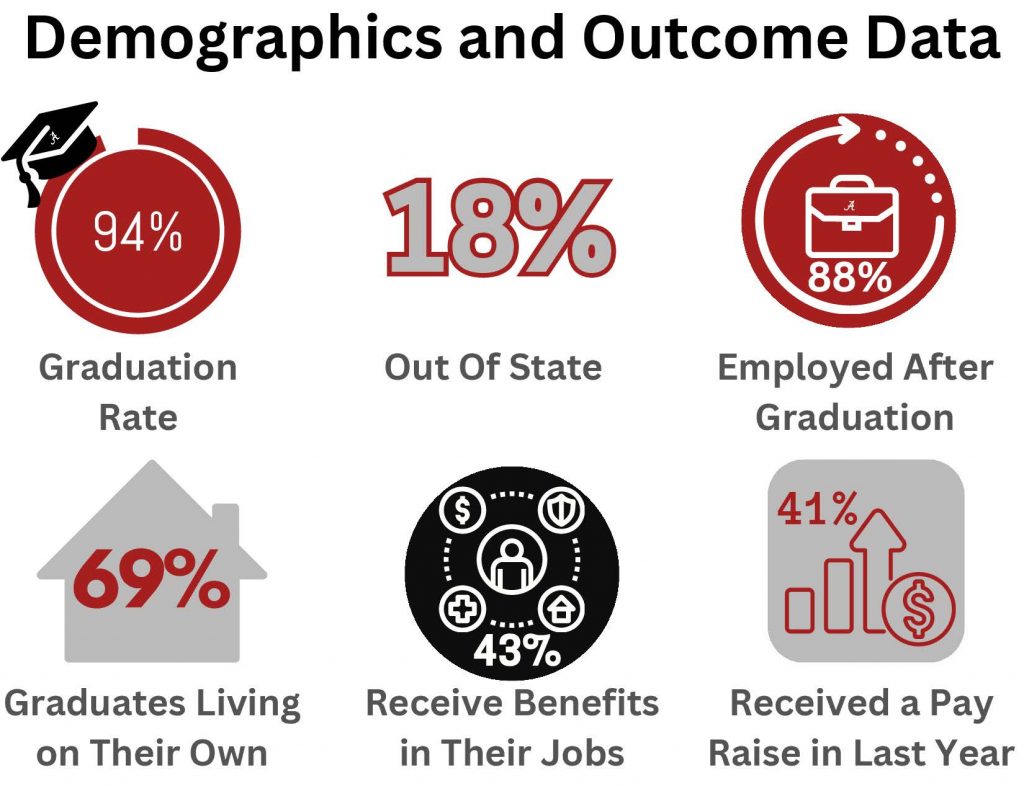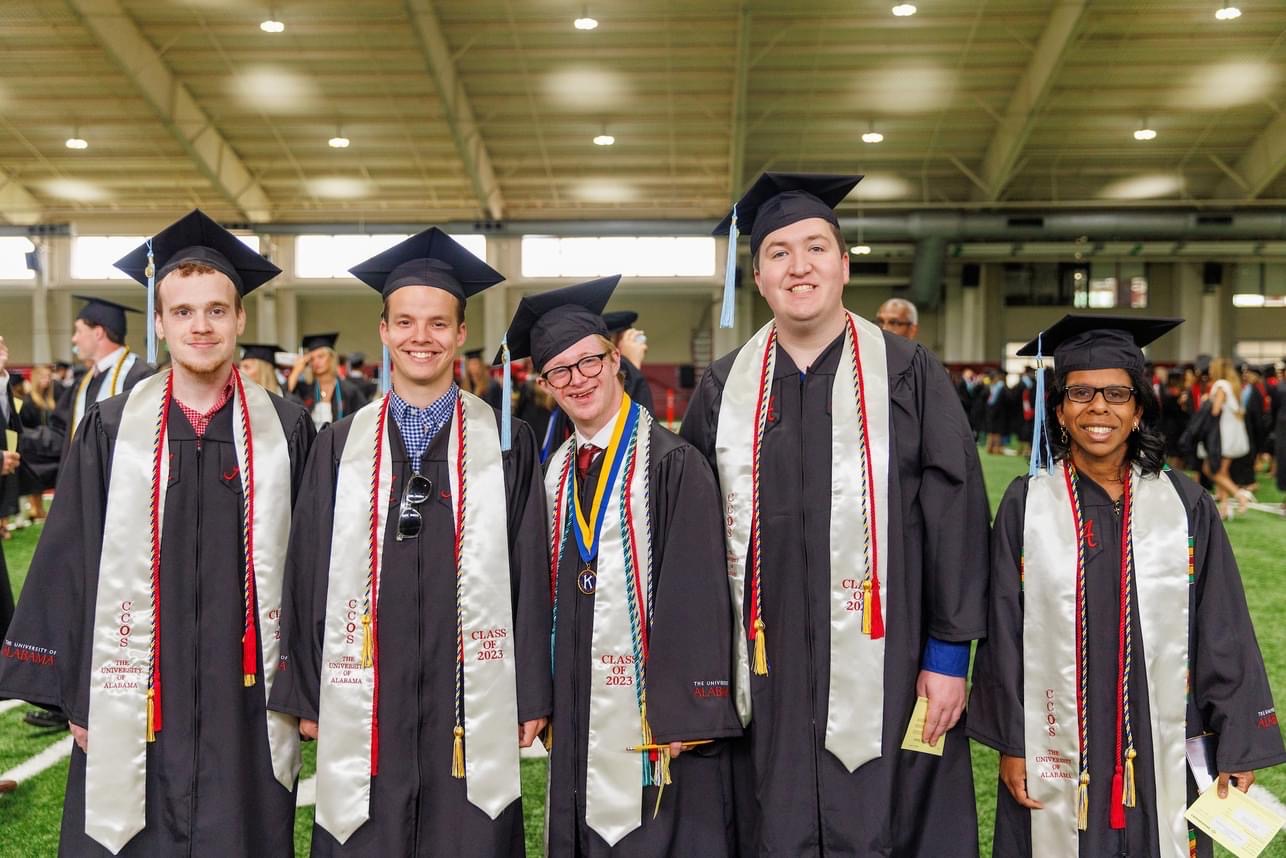OVERVIEW OF THE PROGRAM
Welcome to the Certificate in Occupational Studies Program at The University of Alabama. The CrossingPoints Certificate in Occupational Studies (CCOS) is a non-degree certificate program for young adults with intellectual disabilities who are interested in pursuing postsecondary education at The University of Alabama. CCOS seeks to provide students with intellectual disabilities with high quality and inclusive college experience. Upon successful completion of the CCOS program, you will earn a Certificate in Occupational Studies, which is a non-degree credential.
Students enrolled in CCOS program will:
- Successfully complete individualized academic enrichment goals by earning passing grades in UA courses that provide inclusive supports and will be measured by the CCOS Satisfactory Academic Progress (SAP) rubric.
- Demonstrate knowledge of community-based skills that support self-determination and self-management by successfully completing a portfolio assessment demonstrating their understanding of critical skills for living independently including, but not limited to financial management, transportation, agency/self-determination in academic enrichment courses.
- Demonstrate capacity for self-determination and self-management that also include making sound decisions on personal wellness and socialization as evidenced in earning a rating of Satisfactory as measured by a rubric drawn from the Positive Choices curriculum.
- Gain practical experiences in performing essential skills related to their chosen careers as paid employees in community-based employment settings.

WHY CROSSINGPOINTS?
CrossingPoints: Starting with Why
“We believe in creating learning opportunities for students with intellectual disabilities so that no-one ever has to doubt their value.” (WHY)
We do it by creating and utilizing protocols and procedures that make it possible for others to replicate our success. (HOW)
We test, innovate, explore, and create opportunities for youth with intellectual disabilities to access and participate in inclusive experiences related to:
Community. (WHAT)
- Postsecondary Education
- Independent living
- Recreation/Leisure
- Competitive Integrated Employment

Program of Study
The program includes 24 UA hours, 10 CPP specialized hours, 54 internship hours.
Academic Enrichment Courses (Inclusive): 24 UA hours
| Course ID | Course Title |
|---|---|
| CAT 100 | Computer Applications |
| EN 101 | English Composition |
| COM 123 or COM 225 | Public Speaking Small or Group Communication |
| SPE 300 | Introduction to Special Education |
| SW 351 | Oppression and Social Injustice |
12 additional hours of UA courses based on student’s interests, preferences, and needs (approved by advisor)
Required Independent Living Courses (Specialized): 4 hours
| Course ID | Course Title |
|---|---|
| CPP 111 | Financial Management |
| CPP 260 | Transportation |
| CPP 215 | Agency Awareness |
| CPP 312 | Living Arrangements |
| CPP 327 | Decision Making |
Wellness and Socialization Courses (Specialized): 3 hours
| Course ID | Course Title |
|---|---|
| CPP 224 | Interpersonal Skills |
| CPP 244 | Health and Wellness |
| CPP 267 | Personal Relationships I |
| CPP 268 | Personal Relationships II |
Required Employment Courses (Specialized): 3 hours
| Course ID | Course Title |
|---|---|
| CPP 143 | Career Exploration |
| CPP 290 | Employment Development |
| CPP 300 | Employment Attainment |
| CPP 107 | Workshop in Technology |
Employment Internships (Inclusive): 54 hours
| Course ID | Course Title |
|---|---|
| CPP 101 | Computer ApplicationsInternshInternship I |
| CPP 102 | Internship II |
| CPP 201 | Internship III |
| CPP 202 | Internship IV |
| CPP 301 | Internship V |
| CPP 302 | Internship VI |
| CPP 401 | Internship VII (Optional) |

Costs
The anticipated program fee will be approximately $8,000 per semester. The estimated costs for the program are as follows (links for further information are provided):
In State
| Fall 2023 | Approximated Cost |
|---|---|
| Direct Costs | |
| Tuition | $3,500 (approximately) |
| Room and Board | $4,750 |
| Dining Plan | $1,300 (approximately) |
| Program Fee | $7,050 |
| Direct Total: | $16,600 |
| Indirect Costs | |
| Transportation | $2,146 |
| Books | $800 |
| Miscellaneous | $3,696 |
| Indirect Total: | $6,642 |
| TOTAL APPROXIMATED COSTS: | $23,242 |
Out of State
| Fall 2020 | Approximated Cost |
|---|---|
| Direct Costs | |
| Tuition | $9,200 (approximately) |
| Room and Board | $4,750 |
| Dining Plan | $1,300 (approximately) |
| Program Fee | $7,050 |
| Direct Total: | $22,300 |
| Indirect Costs | |
| Transportation | $3,140 |
| Books | $800 |
| Miscellaneous | $3,696 |
| Indirect Total: | $7,636 |
| TOTAL APPROXIMATED COSTS: | $29,936 |

Admission Requirements
Required
The applicant must:
- Have a documented intellectual disability (per HEOA ,2008, definition);
- Have received a diploma or certificate of completion or equivalent from a high school program;
- Possess functional receptive and expressive communication skills;
- Have a documented history of meeting behavioral and attendance expectations of past employment, training, and/or educational programs;
- Have and maintain health insurance at all times while participating in the program;
- Have the ability to attend to personal, hygiene, and/or medical needs independently, including medication administration, and other routine medical processes and selfcare routines.
- Have the ability or potential to adhere to UA’s social decorum as expressed in the UA Capstone Creed;
- Meet eligibility guidelines for State agencies (such as Vocational Rehabilitation, Medicaid, Adult DD agencies, etc.);
- Have a demonstrated ability to manage free time independently;
- Have a demonstrated ability to self-monitor and self-manage behaviors;
- Have a demonstrated desire to participate in and complete the program; and
- Have the ability to participate in a personal interview.
Preferred
- Be between 19-26 years of age at program entrance.
- Be one’s own legal guardian.
Application
The following items will need to be uploaded within the application portal:
- 2 References Contact Information and Letters of Recommendation;
- Most Current IEP from the final year of IDEA services;
- Most Current Eligibility Report (including the area of disability served in high school);
- High School Completion Documentation (such as a transcript, diploma, etc.);
- Applicant’s Most Updated Resume; and
- Applicants Application Essay [This is an essay explaining why you would like to be considered as a candidate for the CrossingPoints Certificate in Occupational Studies (CCOS). This essay does not have to be in written form. Other examples of acceptable forms of application essays are PowerPoint presentations, artwork, poetry, etc.].

Important UA Links
Questions? Email crossingpoints-CCOS@ua.edu

